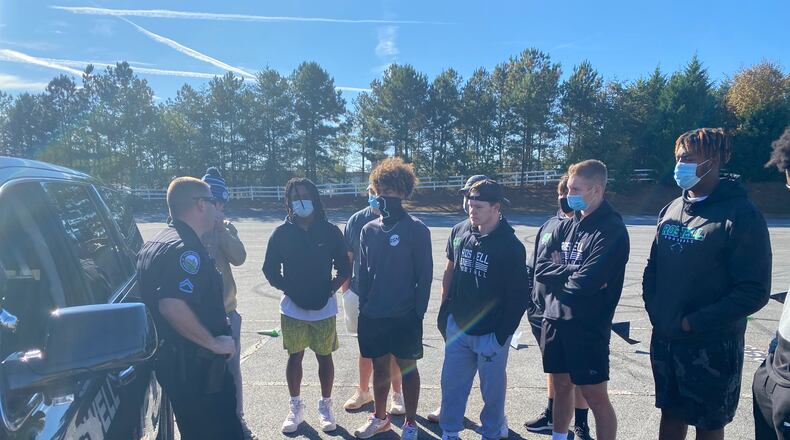For Corey Robinson, the fear of his Black son being hurt by police is unrelenting.
“I can’t sleep at night when he just drives to the high school,” said Robinson, referring to his 17-year-old son who is also named Corey. “If I’m honest, I want our police force to know who our children are. I want police to show them what they should do.”
The Roswell father’s fears have been compounded by the recent torrent of images of violent encounters across the country between police and Black citizens, especially young Black men. Robinson said his family of five have participated in the peaceful protests that took place last summer after the deaths of George Floyd in Minnesota and Rayshard Brooks here in Atlanta.
However, Robinson said he wanted to have more impact closer to home, so he asked the parents on his son’s football team if they’d support a constructive conversation between police and their children.
“I said, ‘We can’t be one Roswell on the field and not off the field. How can we help our boys understand what’s happening and make a positive impact on their lives?’” Robinson said he told the parents.
What followed was an event last weekend where officers from the Roswell Police Department met with about 30 of Roswell High School’s football team members and their parents. Officers told the teens what police are looking for during traffic stops and took questions from the teens. The discussion revealed that sometimes both officer and driver may be in fear of each other in the first few moments.
Roswell Police Department’s Sgt. Brittany Rodgers and Officer Sam Wolfson parked a police car behind another vehicle in the school’s parking lot for the demonstration. They pointed out how officers approaching a car during a traffic stop have a limited view of a driver’s race or gender, or what the person could be reaching for if their hands are not at the top of the steering wheel.
“If you’re refusing to comply with orders, I’m assuming that you intend to hurt me,” Wolfson said. “It’s not about skin color, it’s about respect and we all want to go home at the end of the night.”
Michael Fitzgerald, a wide receiver and quarterback on the high school team, attended with his father who is also named after. The younger Fitzgerald told the AJC that he and his friends see that race is a factor in policing, and he thinks some officers are reluctant to acknowledge that.
“We pay attention to what’s going on,” Fitzgerald said. “(Some police) understand. Everyone is not treated the same and they should make it more fair to everyone.”
Parent Michael Fitzgerald said more teaching needs to go on between officers and the communities they serve. “There is still a long way for them to go to understand the divide between the community and themselves,” he said.
During the event, the younger Corey Robinson asked about a driver’s options if they feel unsafe.
“When things go bad from the start, what do you suggest if I’m with an officer that has my life in danger?” the teen asked.
The officers said that the person should do what they think is best in the given circumstance. Rodgers said the driver can ask to speak to a supervisor. And if the officer refuses, the sergeant suggested calling 911 in order to locate the supervisor.
Players responded they would be uncomfortable further agitating a police officer by reaching for a cellphone.
“Yes, they’re going to be mad but you’re also going to solve the problem by having a supervisor out there,” Rodgers said. The driver should tell the officer what they’re doing and reach for the phone in a reasonable fashion, she said.
Parent Corey Robinson said later that “Some African American parents know a different reality.”
In 2016, Philandro Castile was killed by police in Minnesota as he reached for his identification. Video shows he was shot five times while trying to explain to a traffic officer that he had a firearm inside the car.
Atlanta Criminal Defense Attorney Reginald A. Greene told the AJC that while a person is entitled to assert such rights with a police officer, it’s unwise to do so in an escalated situation.
“I’m not about to say, ‘I know my rights,’” Greene said. “You have to assert them wisely. They’re not designed to be asserted and decided on the side of the road.”
Roswell students and parents who attended the event on traffic stops said they want to see positive interactive conversations with police continue. Roswell football player Anietie Ntekop said he appreciated the police perspective.
“They addressed a lot of the unknowns,” he said.
Young Corey Robinson said he hopes some of the current social unrest with police can be discussed in future conversations.
“It was nice to get cops’ perspective on things,” Corey said. “I feel like I wish it was more centered around people of color because they’re more negatively affected by these types of things. It was still good.”
His father said he accomplished what he wanted that day, which was to kickstart dialogue, if only a little.
There are good and bad employees in every profession, including police, Robinson added. “It’s impossible to train your kid for the bad cop that (George) Floyd met that day.”
About the Author
Keep Reading
The Latest
Featured



